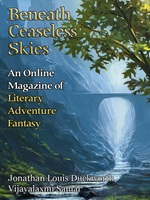 Beneath Ceaseless Skies #439, August 21, 2025
Beneath Ceaseless Skies #439, August 21, 2025
“Bloody Muddy Water” by Jonathan Louis Duckworth
“Postman, Soldier, Traitor” by Vijayalaxmi Samal
Reviewed by Axylus
If the novelette “Bloody Muddy Water” is typical for its author, then Jonathan Louis Duckworth is a good name to remember. In this tale, a witch hunter and two companions seek to kill someone, presumably a witch, who has caused an outbreak of fatal illness in a wetlands city. The power dynamics of the society, its speculative elements, and the murky canals that snake through the setting provide worthy opportunities for exploration. Conjawitches, spellbreakers, devilgirls and other characters are all interesting in their own right. Aside from a song that could have safely been deleted, there are no noticeable flaws in the story as written. However, some elements that were not offered may have increased the story’s impact. One appealing character, for example, was given a nontrivial build-up, but played a trivial role, despite the death of a significant loved one. The story may have benefited from an increased sense of urgency, higher stakes, or more emotional investment from the protagonist or some other character. An event near the beginning that foreshadowed the touching sentiment at its end could potentially have increased the value of both. But even without such things, this is an extremely impressive read. Definitely recommended.
“Postman, Soldier, Traitor” by Vijayalaxmi Samal is a short story that begins quite well. It tells of a boy who has the task of dispatching wounded soldiers after a medieval-style battle. As he does this, he is cursed with a geas to deliver a letter to a home in enemy lands. Its protagonist, setting, and inciting event work together very effectively to draw the reader in. An interesting female character joins him as he travels. However, the story ends in an unsatisfying manner. In the plot formula “promise, progress, payoff,” this story offers at least two substantial promises, a brief foray into progress, and no payoff. It reads like the introduction to a longer work—one which could have been quite good—rather than a tale in its own right.